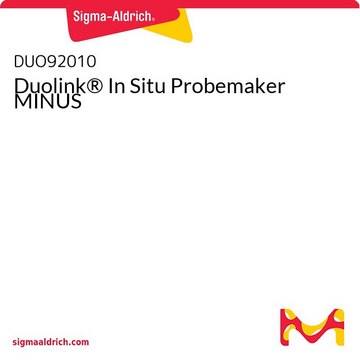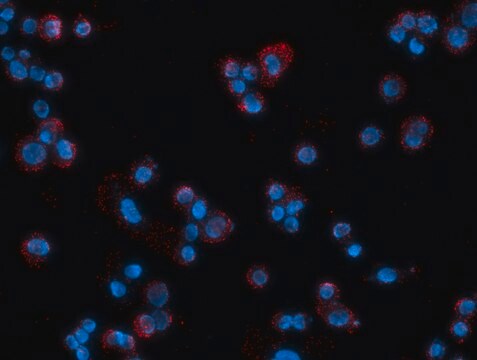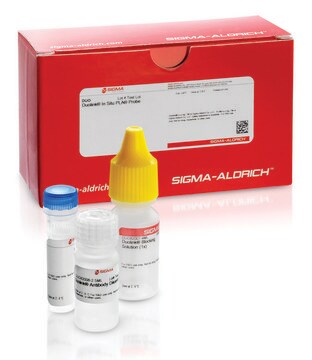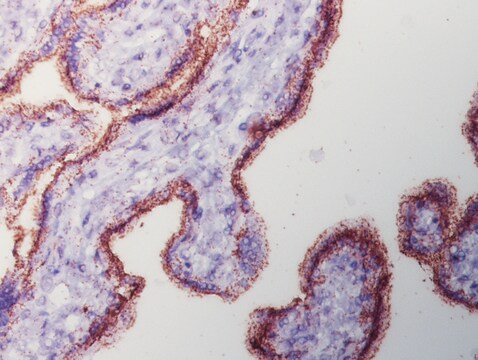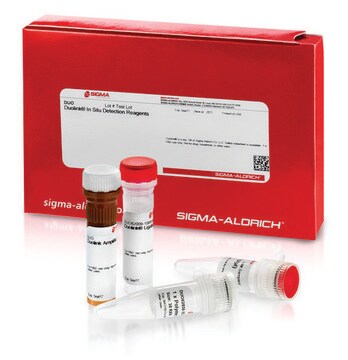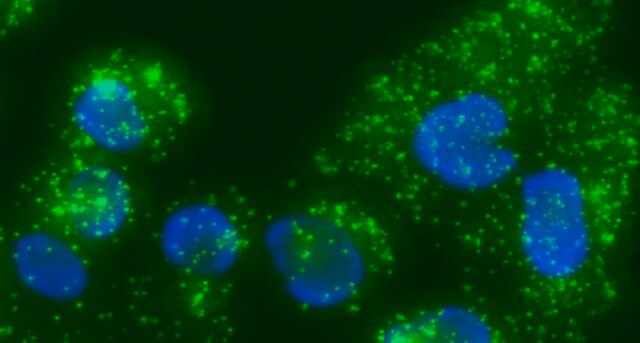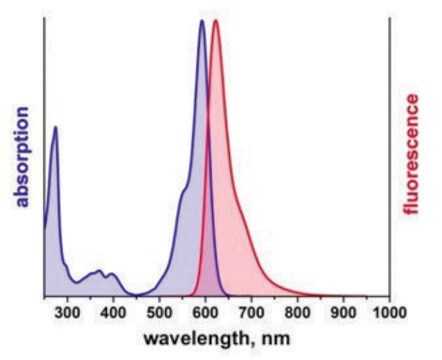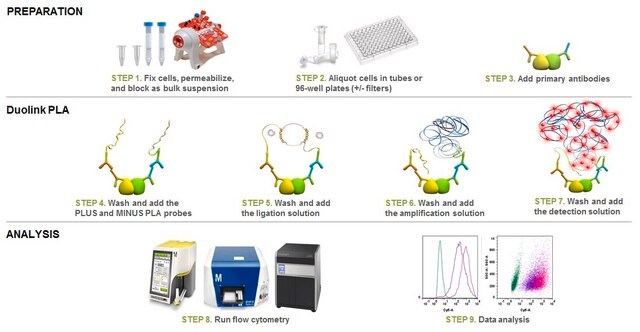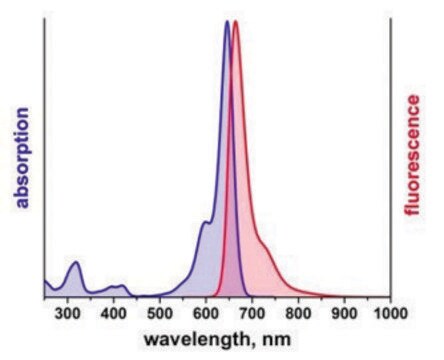DUO92009
Duolink® In Situ Probemaker PLUS
Synonym(s):
in situ Proximity Ligation Assay reagent, Protein Protein Interaction Assay reagent
About This Item
Recommended Products
product line
Duolink®
Quality Level
technique(s)
immunofluorescence: suitable
proximity ligation assay: suitable
suitability
suitable for brightfield
suitable for fluorescence
shipped in
wet ice
storage temp.
−20°C
Related Categories
Application
Let us do the work for you, learn more about our Custom Service Program to accelerate your Duolink® projects
View full Duolink® product list
Specificity
Duolink® In Situ Probemaker extends your possibilities even further by allowing you to create your own PLA probes to meet specific assay requirements.
- Study homodimers
- Study protein-protein interactions with two primary antibodies derived from the same species
- Study protein-protein interactions with primary antibodies from any species
Using Duolink® In Situ Probemaker PLUS and MINUS, you simply conjugate the PLUS and MINUS oligo arms directly to your antibodies in a quick and convenient procedure. As well as providing unique capabilities, this also means there is no longer any limitation as to which species your primary antibodies have to be derived from in order perform a Duolink® In Situ assay.
Application Note
The antibody to be conjugated must have a concentration of 1 mg/ml. Do not use volumes larger than 20 ml for conjugation. The antibody must be in an amine free buffer, ideally PBS. The buffer should be carrier free but may contain up to 0.1% BSA, 5% trehalose, and 0.02% sodium azide.
- Study homodimers by using one monoclonal antibody split into two halves. Label one with the PLUS oligo and the other with the MINUS oligo.
- Use antibodies from same species: study protein-protein interactions, protein modifications, or single proteins, using two primary antibodies derived from the same species. Label one of the antibodies with the PLUS oligo and the other with the MINUS oligo
- Use antibodies from any species: study protein-protein interactions, protein modifications, or single proteins, using one or both primary antibodies derived from species other than mouse, rabbit or goat. Label one of your secondary antibodies with the PLUS oligo and the other with the MINUS oligo. Or, combine one labeled secondary antibody with a standard secondary Duolink®In Situ PLA probe.
Features and Benefits
- No overexpression or genetic manipulation required
- High specificity (fewer false positives)
- Single molecule sensitivity due to rolling circle amplification
- Relative quantification possible
- No special equipment needed
- Quicker and simpler than FRET
- Increased accuracy compared to co-IP
- Publication-ready results
Components
- Duolink® In Situ oligonucleotide PLUS – one vial with lyophilized activated PLUS oligonucleotide for one conjugation of 20 μg antibody
- Conjugation buffer – buffer for conjugation reaction
- Stop reagent – stops conjugation reaction
- Storage solution – buffer for preserving prepared PLA probe (conjugated antibody)
- 20x Assay reagent – reagent to be added to experimenter optimized antibody diluent
- Blocking solution – blocks sample prior to staining with Duolink® In Situ
- PLA probe diluent – buffer for diluting PLA probe (conjugated antibody) to final assay concentration
Other Notes
Follow the Duolink®In Situ Probemaker Protocol to use the Duolink®In Situ Probemaker PLUS and MINUS.This product can be applied to both the Duolink® In Situ Fluorescence Protocol and the Duolink® In Situ Brightfield Protocol depending on the detection reagents used.For more information, see Create Your Own PLA® Probes.
Visit our Duolink® PLA Resource Center for information on how to run a Duolink® experiment, applications, troubleshooting, and more.
Legal Information
Signal Word
Warning
Hazard Statements
Precautionary Statements
Hazard Classifications
Aquatic Chronic 2 - Skin Sens. 1
Storage Class Code
10 - Combustible liquids
WGK
WGK 3
Choose from one of the most recent versions:
Already Own This Product?
Find documentation for the products that you have recently purchased in the Document Library.
Customers Also Viewed
Articles
Find Duolink references based on the type of method used, post translational modification detected, and research focus.
Things to consider for preparation, setup and execution of the Duolink® assay protocol
Support information including tips and tricks, frequently asked questions, and basic troubleshooting.
Protocols
Duolink® kits use in situ PLA®, a proximity ligation assay technology, to accurately and objectively quantify individual proteins, and their interactions and modifications in unmodified cells and tissue.
Our team of scientists has experience in all areas of research including Life Science, Material Science, Chemical Synthesis, Chromatography, Analytical and many others.
Contact Technical Service